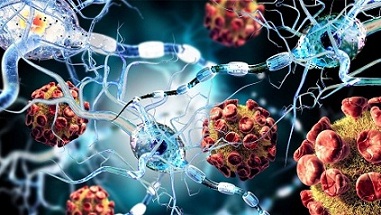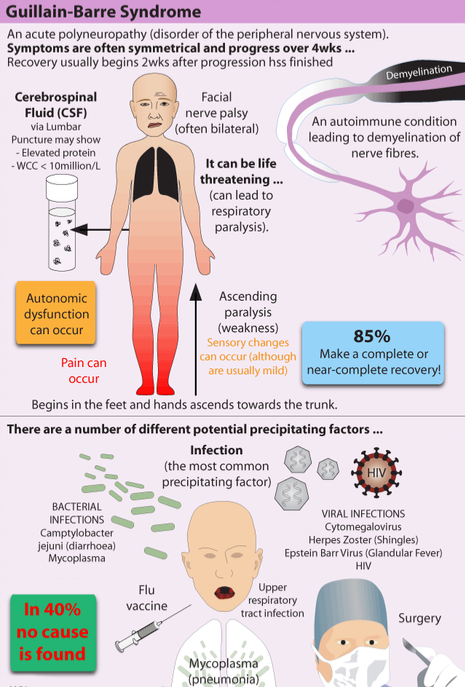Collaborative International Study Confirms That SARS-CoV-2 Infection Can Trigger Guillain-Barré Syndrome
Source: Guillain-Barré Syndrome and COVID-19 Sep 23, 2021 3 years, 7 months, 3 days, 7 hours, 55 minutes ago
Guillain-Barré Syndrome and COVID-19: A new international collaborative study has confirmed that SARS-CoV-2 infections can trigger Guillain-Barré Syndrome.

Guillain-Barré syndrome (GBS) is a rare, autoimmune disorder in which a person's own immune system damages the nerves, causing muscle weakness and sometimes paralysis. GBS can cause symptoms that last for a few weeks to several years. Most individuals recover fully, but some have permanent nerve damage.
The collaborative study involving researchers from multiple research institutions around the world including the University Medical Center Rotterdam-Netherlands, University of Würzburg-Germany, Hôpital de La Timone-France, IRCCS Ospedale Policlinico- Italy, University of Padova-Italy, Bellvitge University Hospital-Spain, University Hospital of Larissa-Greece, CHU de Bicêtre-France, Jeroen Bosch Hospital-Netherlands, Aarhus University Hospital-Denmark, HFR Fribourg Hôpital Cantonal-Switzerland, Haaglanden Medical Center- Netherlands, University of Lausanne-Switzerland, University of Geneva-Switzerland, Hospital Clinic-Spain, University of Oxford-UK, University of Bern-Switzerland, Kindai University-Japan, Jining Medical University-China and the IGOS consortium.
During the SARS-CoV-2 pandemic, an increasing number of patients with neurological disorders, including Guillain-Barré syndrome (GBS), have been reported following this infection. It remains unclear, however, if these cases are coincidental or not, as most publications were case reports or small regional retrospective cohort studies.
The international Guillain-Barré syndrome (GBS) Outcome Study is an ongoing prospective observational cohort study enrolling patients with GBS within 2 weeks from onset of weakness. Data from patients included in this study, between 30 January 2020 and 30 May 2020, were used to investigate clinical and laboratory signs of a preceding or concurrent SARS-CoV-2 infection and to describe the associated clinical phenotype and disease course.
Patients were classified according to the SARS-CoV-2 case definitions of the European Centre for Disease Prevention and Control and laboratory recommendations of the WHO.
A total of forty-nine patients with GBS were included, of whom eight (16%) had a confirmed and three (6%) a probable SARS-CoV-2 infection. Nine of these 11 patients had no serological evidence of other recent preceding infections associated with GBS, whereas two had serological evidence of a recent
Campylobacter jejuni infection.
The study found that patients with a confirmed or probable SARS-CoV-2 infection frequently had a sensorimotor variant 8/11 (73%) and facial palsy 7/11 (64%). The eight patients who underwent electrophysiological examination all had a demyelinating subtype, which was more prevalent than the other patients included in the same time window [14/30 (47%),
P = 0.012] as well as historical region and age-matched control subjects included in the International GBS Outcome Study before the pandemic [23/44 (52%),
P = 0.016]. The median time from the onset of infection to neurological symptoms was 16 days (interquartile range 12–22).
The
ref="https://www.thailandmedical.news/">Guillain-Barré Syndrome-COVID-19 study found that patients with SARS-CoV-2 infection shared uniform neurological features, similar to those previously described in other post-viral GBS patients. The frequency (22%) of a preceding SARS-CoV-2 infection in our study population was higher than estimates of the contemporaneous background prevalence of SARS-CoV-2, which may be a result of recruitment bias during the pandemic, but could also indicate that GBS may rarely follow a recent SARS-CoV-2 infection.
The study findings were published in the peer reviewed journal: Brain
https://academic.oup.com/brain/advance article/doi/10.1093/brain/awab279/6373760
Thailand Medical News had also covered about the Guillain-Barré Syndrome
being triggered as a result of COVID-19 since mid-last year.
https://www.thailandmedical.news/news/breaking-guillain-barre-syndrome-a-rare-neurological-disorder-manifesting-in-more-covid-19-patients
https://www.thailandmedical.news/news/covid-19-news-scientist-from-rutgers-university-warns-that-guillain%E2%80%93barr%C3%A9-syndrome-can-be-triggered-by-sars-cov-2
The new study findings also confirm that a COVID-19 infection may prompt Guillain-Barré syndrome.

Since December 2019, the COVID-19 pandemic has affected the entire world, either by direct infection or through its social and economic consequences.
Aside from the well-known severe respiratory signs, and the risk of long-term complications, researchers and public health officials have also reported both central and peripheral neurological complications.
The Guillain-Barré syndrome is an autoimmune disorder in which a person's immune system attacks the nerves, causing muscle weakness and occasionally paralysis. The disease can last for weeks or several years. The disease is relatively rare (In the United States 3,000-6,000 people develop the condition every year) but can be severe.
The medical condition is triggered by an acute bacterial or viral infection. Since the beginning of the pandemic, doctors have reported over 90 Guillain-Barré diagnoses following a possible COVID-19 infection.
However, whether COVID-19 is another potential infectious trigger or whether the reported cases are coincidental is unclear.
Utilizing an international collection of Guillain-Barré syndrome patients known as the International GBS Outcome Study (or IGOS), the research team studied patients from January 30th until May 30th 2020. Some 49 Guillain-Barré syndrome patients were added to the study during this period from China, Denmark, France, Greece, Italy, the Netherlands, Spain, Switzerland, and the United Kingdom.
It should be noted that in this cohort study, 22% of the Guillain-Barré syndrome patients included during the first 4 months of the pandemic had a preceding COVID-19 infection.
These study participants were all over 50 years of age and patients frequently (65%) experienced facial palsy (64%) and had a demyelination form of GBS.
At hospital admission, 73% of the Guillain-Barré patients with a COVID-19 infection had increased inflammatory markers. All these patients fulfilled the diagnostic criteria for both Guillain-Barré syndrome and COVID-19.
The study team emphasized, however, that they did not find more patients diagnosed with Guillain-Barré syndrome during the first four months of the pandemic compared to previous years. This suggests that while a strong association between a COVID-19 infection and Guillain-Barré syndrome is not likely, a COVID-19 infection may simply sometimes lead patients to develop Guillain-Barré syndrome.
It should be noted that an earlier British study by researchers from University College London-UK or UCL, also published in the Brain journal, claimed that there was no association between COVID-19 and Guillain-Barré syndrome.
https://www.ucl.ac.uk/news/2020/dec/no-association-between-covid-19-and-guillain-barre-syndrome
For more on
Guillain-Barré Syndrome and COVID-19, keep on logging to Thailand Medical News.

